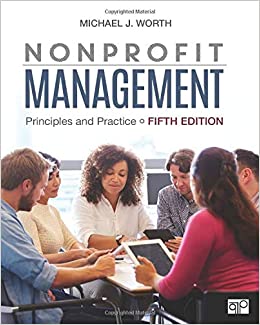Description
A Revolution in Management
A Distinct Profession
Nonprofit Management as a Field of Study
Toward a Balanced Approach
Proceeding With Realism and Pride
Chapter Summary
Key Terms and Concepts
Questions for Discussion
Suggestions for Further Reading
Books
Articles
Websites
America’s Nonprofit Sector: A Historical Overview
Searching for a Common Vocabulary
Alternatives to Nonprofit
Size of the U.S. Nonprofit Sector
Differentiating the Nonprofit Sector
National Taxonomy of Exempt Entities
IRS Classifications
Salamon’s Anatomy
The Spectrum of Organizations
Emerging New Models
Commercialization and Tax Exemption
Implications for Nonprofit Managers
Chapter Summary
Key Terms and Concepts
Case 2.1 The Chan-Zuckerberg Initiative
Case 2.2 A Double Bottom Line: Ben & Jerry’s
Questions for Discussion
Suggestions for Further Reading
Books
Articles/Book Chapters
Websites
Explaining the Nonprofit Sector
Nonprofit Theory Across the Disciplines
The Failure Theories
Market and Government Failure
Nonprofits as Gap Fillers
Supply-Side Theories
Theories of Altruism and Giving
Theory of the Commons: An Interdisciplinary Approach
Changing Definitions of Private, Public, and Common
Explaining Nonprofit Organizations
Characteristics of Nonprofit Organizations
Nonprofits as Open Systems
Resource Dependence
Isomorphism
Explaining Nonprofit Organizational Structures
Organizational Culture
Chapter Summary
Key Terms and Concepts
Case 3.1 The Smithsonian Institution and the Catherine B. Reynolds Foundation
Case 3.2 The National Trust for Historic Preservation
Questions for Discussion
Suggestions for Further Reading
Books
Articles
Types of Governing Boards
Elected Boards
Self-Perpetuating Boards
Appointed and Hybrid Boards
Advisory Councils
The Governing Board’s Responsibilities
The Governing Board’s Legal Responsibilities
The Governing Board’s Functional Responsibilities
The Board and the CEO
Carver’s Policy Governance Model
Chait, Ryan, and Taylor: Governance as Leadership
Herman and Heimovics: Psychological Centrality and Board-Centered Leadership
Explaining Board Behavior
Managing Nonprofit Boards
Role of the Chair
Governance Committee
Board Professionals
Nonprofit Board Effectiveness
Critics of Board Performance
The Search for Best Practices
The Challenge of Nonprofit Governance
Chapter Summary
Key Terms and Concepts
Case 4.1 Sweet Briar College
Case 4.2 The Hershey Trust
Questions for Discussion
Suggestions for Further Reading
Books/Reports
Websites
The CEO’s Job
Management and Leadership
Overview of Leadership Theories
An Evolution in Thinking
Transformational Leadership
Charismatic Leadership
The Effective Nonprofit CEO
Focus on Mission
Focus on the Board
Focus on External Relationships
Share Leadership and Empower Others
Focus on Key Roles and Priorities
Use the “Political Frame”
Right Person, Right Place, Right Time
Founder Syndrome
Executive Transitions
Leading Change
Chapter Summary
Key Terms and Concepts
Case 5.1 A Change in Leadership at Habitat for Humanity
Case 5.2 Challenge and Change at United Way
Questions for Discussion
Suggestions for Further Reading
Books
Articles
Websites
Defining and Ensuring Accountability
Mechanisms for Accountability
Requirements of Law
Self-Regulation: Standards and Accreditation
Transparency
Measuring and Managing Performance
Financial Ratios
Benchmarking
Outcomes
Balanced Scorecard
Social Return on Investment
Blended Value
Performance Measurement: The Continuing Debate
Chapter Summary
Key Terms and Concepts
Case 6.1 The Wounded Warrior Project
Case 6.2 Youth Villages
Questions for Discussion
Suggestions for Further Reading
Books
Articles/Report
Websites
Understanding Strategy
Strategic Planning and Strategic Management
The Strategic Planning Process
Planning to Plan
Defining Mission, Vision, and Values
Assessing the Situation
Identifying Strategic Issues
Setting Goals
Developing Strategies
Setting Objectives
Writing the Strategic Plan
Developing an Operational Plan
Benefits and Limitations of Strategic Planning
Building Organizational Capacity
Defining and Understanding Capacity
Capacity Building in Action
A Model for Capacity Building
Capacity and Organizational Life Cycles
Capacity Building Evaluated
Managing Risk
Chapter Summary
Key Terms and Concepts
Case 7.1 New Hope Housing Strategic Plan 2013–2018
Questions for Discussion
Suggestions for Further Reading
Books/Brochure
Articles
Websites
Growing Interest in Collaboration
A Continuum of Relationships
Exploring Collaborations and Mergers
Drivers of Collaborations and Mergers
Obstacles to Collaboration and Merger
Motivations
Culture
Egos
Brand Identity
Community or Political Objections
Costs
Conditions for Success
Driven by Mission
Commitment From Top Leadership
Trust
Relatedness
Process
Collaborations and Mergers Within National Nonprofits
Cross-Sector Collaboration
A Continuum of Cross-Sector Collaboration
Advantages and Disadvantages of CSCs
Obstacles and Conditions for Success
Achieving Collective Impact
Chapter Summary
Key Terms and Concepts
Case 8.1 N Street Village and Miriam’s House
Questions for Discussion
Suggestions for Further Reading
Books
Articles/Report
Websites
Human Resources Management
An Overview of Management Theories
Understanding Human Motivations
Maslow’s Hierarchy of Needs
McGregor: Theory X and Theory Y
McClelland: Three Needs Theory
Myers and Briggs: Personality Types
Herzberg: Motivators and Dissatisifers
Motivations of Nonprofit Staff
Life Cycles and Generations
Applying Theories to Managing the Nonprofit Workforce
Managing Volunteers
Types of Volunteers
Motivations of Volunteers
Volunteer Program Practices
Volunteer Management as a Career Field
The Future of Volunteerism
Chapter Summary
Key Terms and Concepts
Case 9.1 Getta Grant
Case 9.2 Rita Writer
Case 9.3 Bob the Builder
Case 9.4 Myra the Volunteer Manager
Questions for Discussion
Suggestions for Further Reading
Books/Book Chapter
Websites
Defining and Understanding Marketing
Marketing Serves the Mission
Marketing Means Action
Marketing as a Process
The Marketing Mix
Product
Place
Promotion
Market Segmentation
Price
Defining the Exchange
Building the Brand
Integrated Marketing Communication (IMC)
Crafting an Effective Message
Crisis Communications
Social Media
From Gatekeepers to Connectors
Social Media Planning
Operational Questions
Evaluating Marketing and Communication
Chapter Summary
Key Terms and Concepts
Case 10.1 Rebranding 4-H
Case 10.2 Susan G. Komen Foundation
Questions for Discussion
Suggestions for Further Reading
Books/Journals
Websites
Basic Distinctions
Overview of Lobbying Law
Option I: Substantial Part Test
Option II: 501(h) Expenditure Test
Political Campaign Activity
Implementing an Advocacy Program
Using Social Media
Continuing Issues and Concerns
Chapter Summary
Key Terms and Concepts
Case 11.1 Mothers Against Drunk Driving (MADD)
Case 11.2 Housing First
Case 11.3 National Audubon Society
Questions for Discussion
Suggestions for Further Reading
Books
Articles
Websites
Definitions of Key Concepts
Understanding Nonprofit Finances
Nonprofit Financial Statements
Statement of Financial Position
Statement of Activities
Statement of Cash Flows
Statement of Functional Expenses
Required Disclosures and Notes to Financial Statements
Audits
Using Financial Ratios
Managing Endowment Funds
Developing and Managing the Budget
Financial Policies and Controls
Chapter Summary
Key Terms and Concepts
Case 12.1 Hull House
Case 12.2 Corcoran Gallery of Art and Corcoran School of the Arts and Design
Questions for Discussion
Suggestions for Further Reading
Books
Newsletter
Websites
Definitions and Distinctions
Motivations for Giving
Understanding Corporate Philanthropy
Foundation Giving
Motivations of Individual Donors
The Fundraising Process
Identifying Priorities and Developing the Case
Identifying and Qualifying Prospects
Cultivating Prospects
Soliciting the Gift
Acknowledging and Recognizing Donors
Stewarding the Gift and the Relationship
Individual Donor Life Cycles
Planned Giving
Campaigns
Managing Fundraising Programs
Advancement Services
Prospect Management
Fundraising Efficiency and Effectiveness
Staff Performance and Accountability
Ethics and Professional Standards
Chapter Summary
Key Terms and Concepts
Cases 13.1 a–g Fundraising Ethics
Questions for Discussion
Suggestions for Further Reading
Books
Articles
Websites
Defining Social Enterprise and Earned Income
Why Earned Income?
Partnerships With Business
Licensing
Sponsorships
Cause Marketing
Other Variations
Integrated Relationships
Operational Relationships
Putting Partnerships Together
Nonprofit Business Ventures
Identifying Business Opportunities
Feasibility Analysis and Business Planning
Earned-Income Strategies: Issues and Decisions
Sorting Out the Issues
Evaluating Opportunities Against Mission
A Continuing Debate
Chapter Summary
Key Terms and Concepts
Case 14.1 Minnesota Public Radio
Case 14.2 Aspire CoffeeWorks
Questions for Discussion
Suggestions for Further Reading
Books
Articles
Websites
Changes in Sources and Patterns of Support
Grants, Contracts, and Fees
Government Support: Opportunities and Challenges
Seeking Government Support
Identifying Grant Opportunities
Evaluating Grant Opportunities
Preparing and Submitting an Application or Proposal
Nonprofits in the Policy Arena
Chapter Summary
Key Terms and Concepts
Case 15.1 SEED Foundation
Questions for Discussion
Suggestions for Further Reading
Books
Articles
Websites
Defining and Understanding Social Entrepreneurship
Social Enterprise School
Social Innovation School
History of Social Entrepreneurship as a Field
Theories of Social Entrepreneurship
Social Entrepreneurship Across Fields and Around the World
Building High-Impact Nonprofits
Sustaining Innovation
The Future of Social Enterprise and Social Entrepreneurship
Chapter Summary
Key Terms and Concepts
Case 16.1 KaBOOM!
Case 16.2 Harlem Children’s Zone
Questions for Discussion
Suggestions for Further Reading
Books/Journa
Websites
Definitions and Scope of International Organizations
International Philanthropy and Fundraising
International Giving
Global Fundraising
International Nonprofit Governance and Management
Managing Across Cultures
Governing International and Global Organizations
Structuring International NGOs
Chapter Summary
Key Terms and Concepts
Case 17.1 Médecins Sans Frontières/Doctors Without Borders
Case 17.2 Haitian Earthquake Relief and Recovery
Questions for Discussion
Suggestions for Further Reading
Books
Websites
1. New York City Opera
2. Share Our Strength/No Kid Hungry
3. The Y
4. The Girl Scouts of the United States of America






